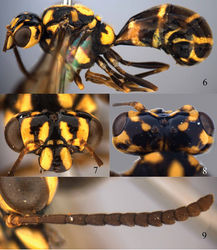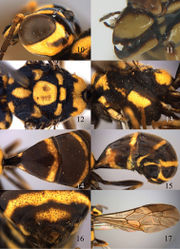Bakeronymus
| Notice: | This page is derived from the original publication listed below, whose author(s) should always be credited. Further contributors may edit and improve the content of this page and, consequently, need to be credited as well (see page history). Any assessment of factual correctness requires a careful review of the original article as well as of subsequent contributions.
If you are uncertain whether your planned contribution is correct or not, we suggest that you use the associated discussion page instead of editing the page directly. This page should be cited as follows (rationale):
Citation formats to copy and paste
BibTeX: @article{Chen2014ZooKeys385, RIS/ Endnote: TY - JOUR Wikipedia/ Citizendium: <ref name="Chen2014ZooKeys385">{{Citation See also the citation download page at the journal. |
Ordo: Hymenoptera
Familia: Trigonalyidae
Name
Bakeronymus Rohwer, 1922 – Wikispecies link – Pensoft Profile
- Bakeronymus Rohwer, 1922: 417; Weinstein and Austin 1991[1]: 417; Carmean and Kimsey 1998[2]: 59. Type species (by original designation): Bakeronymus typicus Rohwer, 1922 (examined).
Diagnosis
Body length 7.7–10.1 mm; antenna with 13–15 segments, of female third antennal segment 0.8 times as long as fourth segment and slender (Fig. 9); apical half of antenna of female and of male with hardly moniliform and symmetric segments (Fig. 9); male antenna without tyloids; antennal sockets closer to eyes than to each other; vertex with medio-longitudinal depression dorsally, widened anteriorly and posteriorly (Fig. 8); anterior ocellus slightly lower situated than posterior ocelli in depression (Fig. 8); clypeus not differentiated from face; mandibles narrow in anterior view, mandibular condyli far from eye and submedially attached to head (Fig. 10); maxillary and labial palpi with 4 and 2 segments, respectively and apical segment of labial palp slender and tapered; maxillary palp about 0.7 times as long as mandible and with distinct segments (Fig. 11); vein 1-SR of fore wing short (Fig. 17); hind basitarsus enlarged; hind trochanter without oblique groove; propodeal foramen rounded dorsally and with lamelliform rim (Fig. 12); first tergite subpetiolate and comparatively narrow basally (Fig. 14); protuberance of second sternite of + small and forked, and of third sternite large and obtuse.
Biology
Reared from the nest of Polistinae (Vespidae) (Yamane and Terayama 1983[3]).
Taxon Treatment
- Chen, H; van Achterberg, C; He, J; Xu, Z; 2014: A revision of the Chinese Trigonalyidae (Hymenoptera, Trigonalyoidea) ZooKeys, 385: 1-207. doi
Other References
- ↑ Weinstein P, Austin A (1991) The host relationships of trigonalyid wasps (Hymenoptera: Trigonalyidae), with a review of their biology and catalogue to world species. Journal of Natural History 25(2): 399–433. doi: 10.1080/00222939100770281
- ↑ Carmean D, Kimsey L (1998) Phylogenetic revision of the parasitoid wasp family Trigonalidae (Hymenoptera). Systematic Entomology 23: 35–76. doi: 10.1046/j.1365-3113.1998.00042.x
- ↑ Yamane S, Terayama M (1983) Description of a new subspecies of Bakeronymus typicus Rohwer parasitic on the social wasp Parapolybia varia Fabricius in Taiwan (Hymenoptera: Trigonalidae). Memoirs of the Kagoshima University Research Center for the South Pacific 3: 169-173.
Images
|

